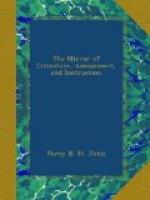[18] See Dupleix, Historic de France,
vol. ii. p. 257. ed. 1634.
The original authority is Nangis (Annales
de St. Louis, p. 174.
ed. 1761.) Rigord, who speaks of the sale
of this relic to
Philip Augustus, appears to be guilty of
a fable or anachronism,
in which he was follow by Raynaldus, Annal.
Eccles. A.D. 1205,
No. 60.
[19] See L’Estoile, Journal
de Henri III., vol. i. p. 125, 161,
ed. 1744.
[20] Zech. ch. xiv. ver. 20.
[21] Annal. Eccles. A.D. 326. No. 54.
[22] See a Letter from Innocent
VI. ap. Raynald Annal. Eccles. A.D.
1354. No. 18.
* * * * *
[To this class likewise belongs a Pilgrimage to the Holy Sepulchre, from the accomplished pen of Contarini Fleming. The lighter papers are tinged with a high moral feeling; and we do not think that better evidence will be found than in the following of Mrs. Hall’s contributions.]
THE TRIALS OF GRACE HUNTLEY.
[This tale occupies nearly fifty pages. It so teems with moral pathos and touching beauty, that we are at a loss to abridge it throughout so as to preserve that acquaintance with the finest feelings of our nature, which marks every page with sterling value. We, therefore, only adopt the conclusion, and attempt a leading thread of the story. Grace is the daughter of a village schoolmaster. She loves “not wisely, but too well,” “Joseph Huntley, the handsomest youth in the retired village of Craythorpe.” The father consents to their union. The real character of the husband appears early; his fond love soon dwindles to painful neglect: how truly does the writer observe, “the rapidity with which love may glide from the heart of man is a moral phenomenon for which it would puzzle philosophers to account. The brief space of a few months not unfrequently converts the devoted into the unkind, or to a delicate mind still worse—the neglectful husband.” The wayward Huntley breaks off church-going; he refuses Grace his company, and we find her first solitary walk since her marriage thus touchingly referred to: “almost every tree certainly every stile she passed—was hallowed by some remembrance connected with the playmate of her childhood—the lover of her early youth—the husband of her affections.” When, she looked on the dew dancing amid the delicate tracery of the field spider’s web—when the joyous whistle of the gay blackbird broke upon her ear—gazing silently on all that was really fresh and beautiful in nature—she felt that, instead of warming, it fell chilly upon her heart. And yet all was as usual—the bright sun, and the smiling landscape. Why, then, was she less cheerful? She was alone! No one she loved was by her side, to whom to say, “How beautiful!” Joseph gets into debt, and upon Grace offering to sacrifice a favourite article of dress to enable him to keep a “promise to pay,”




